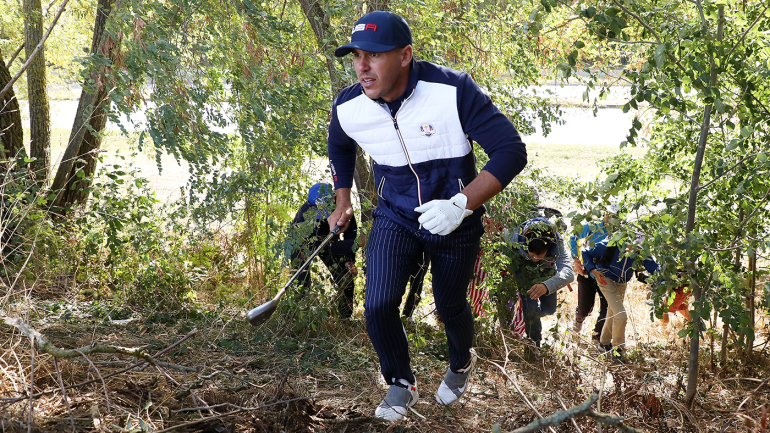
You could fill up the Library of Congress with theories about why the United States has lost seven of the last nine Ryder Cups. No idea is off limits, no scenario too fanciful. From scripting to spin rates to improper pods to incompatible psychological test scores, if a reason is tangentially plausible, it has been floated by those who watch, follow and obsess over the Ryder Cup.
Ahead of the 2020 Ryder Cup, there's no reason to exasperate ourselves by exploring the myriad possibilities as to why the U.S. has struggled despite so often having the more talented team. Thanks to Brooks Koepka, who sat down for an interview with Golf Digest, we have the primary answer. Koepka, an automatic qualifier for this year's team (his playing status is unknown due to a wrist injury) who played on the 2016 and 2018 teams, said the quiet part out loud.
"It's different. It's hectic. It's a bit odd, if I'm honest," Koepka said of his Ryder Cup experiences. "I don't want to say it's a bad week. We're just so individualized, and everybody has their routine and a different way of doing things, and now it's like, 'OK, we have to have a meeting at this time or go do this or go do that.' It's the opposite of what happens during a major week."
"It's tough," he added. "There are times where I'm like, 'I won my match. I did my job. What do you want from me?' I know how to take responsibility for the shots I hit every week. Now, somebody else hit a bad shot and left me in a bad spot, and I know this hole is a loss. That's new, and you have to change the way you think about things. You go from an individual sport all the time to a team sport one week a year. It's so far from my normal routine."
He went on to say that he missed getting to take naps, go to the gym or decompress by watching TV because those were his routines during major championship weeks (where his record is sterling).
Koepka has made a career feasting on those he might consider mentally inferior athletes, men whose minds get mushy at the thought of ascending to the top of the food chain, players who can't handle the mentally taxing minefields at major championships. So it's a bit of an own goal when he admits how much he struggles to swap a nap for a get-together in team dining to discuss Saturday pairing strategies. He actually sounds a lot like the golfers at whom we normally see him sneer.
All of this would be fine if it existed in a vacuum. Worthy of parody, sure, but ultimately fine. However, Ian Poulter has a garage full of Ferraris to prove the Ryder Cup is not played by individuals in a vacuum.
The idea that mediocre teams can beat great individuals in sports, and especially in golf, is a bit overdramatized for my taste (12 Jon Rahms are pretty much always going to beat any team you could feasibly assemble). Still, it's difficult to ignore the "culture beats talent" flag the European side has flown for one week every two years for the last few decades.
The first problem here is that Koepka has real sway. He's done the thing, subdued the seas, conquered the unknown. His treasure chest is full. He is a genuine badass on the golf course in a world where players like him are seemingly facing extinction. He carries real weight. At this level, major championship trophies are currency, and Koepka has plenty to spend.
Imagine how galvanizing it would be for him to walk in the U.S. team room and take on a real leadership role. Asking captain Steve Stricker where he's needed. Taking youngsters Scottie Scheffler and Harris English under his wing. Leveraging his superstardom for the good of a team he should be leading.
I have no confidence that will happen, of course, but the U.S. has enough bought-in stars (think Justin Thomas and Jordan Spieth), that it probably doesn't matter. If they were structured more like Europe (with Jon Rahm and Rory McIlroy at the top), then they might be cooked.
This leads to the second issue with Koepka's statements, and it's the one that has haunted the U.S. side for nearly 20 years.
If you have to boil down why Europe succeeds at the Ryder Cup to one word, it's trust.
The Europeans trust one another far more than the Americans. This is neither a controversial stance nor a difficult one to land on when you hear what Koepka says. Pick a year, and you'll find something flowing from the U.S. side that has disfigured trust. Even in the only year the U.S. has won in the last decade (2016 at Hazeltine), I left the post-event press conferences believing that the European team had far more trust in one another than the U.S. and that was a Euro team that had just been torched.
The First Cut crew discusses Brooks Koepka's Ryder Cup dedication and the impact he has on U.S. team morale. Follow & listen to The First Cut on Apple Podcasts and Spotify.
So, you might be wondering why trust matters. You're (mostly) hitting your own golf shots, playing your own ball and trying to put together a score. Trust matters because there is a lot going on during a Ryder Cup week. The golf, at times, can seem complementary rather than primary. When there's a lot going on, there's a lot to think about, sort out and consider.
What is the one variable that can change your on-course play the most in a given week? It's your mentality, right? When there's too much mental clutter, too many things you're thinking about besides the golf -- like not knowing with whom you're going to be paired or whether Patrick Reed is going to throw you under the bus or why Koepka and Dustin Johnson aren't speaking or anything else outside of the golf that's in front of you -- your play suffers.
Europe has created a space where trust can co-exist with some of the biggest personalities and egos in sports, even if just for one week. That trust engenders vulnerability, which (when received properly) creates more trust. A cycle of success that leads to lesser teams consistently beating better ones.
"I see the way they support each other, and I see the way that they have this foundation of support amongst each other to lift each other up," Phil Mickelson said recently on the 5 Clubs podcast with Gary Williams. "I see them walking together side-by-side in the fairways and with a vision of solidarity, if you will. I see them helping each other get the best out of each other."
It really is all about trust.
"The togetherness of the team, the great camaraderie we have, that's built up on the European Tour. Obviously we all have our separate lives going on, but once we get together for The Ryder Cup, we all come together as one," said Rory McIlroy after Europe won in Paris in 2018. "You know, it was just such a good week."
This might seem completely irrelevant as it relates to hitting 4-irons from 225 yards -- the U.S. team has essentially tried to argue that it is for a long time -- but it is not. If you can't completely trust everybody in the room (including, as we saw in 2014, the captain), it becomes extraordinarily difficult to have the mental clarity necessary in a week of chaos like the Ryder Cup. And it seems difficult to trust somebody who so brazenly and loudly and even tauntingly says, I'm doing my job, you gonna do yours? instead of I'm doing my job, how can I help you accomplish yours? It's a small shift in thinking with massive ramifications.
Maybe none of this even matters. All of this might be for naught if Koepka remains injured and doesn't play. It doesn't mean the malaise is eradicated, but it does mean one of this year's problems is certainly erased. And perhaps all of this is even a bit overstated. Perhaps Koepka is different behind closed doors than he is on magazine covers. Perhaps he is beloved by his teammates. Or perhaps the U.S. talent is so overwhelming that it covers up everything else.
However, we have a lot of evidence piled up that tells us this is not even a Koepka-centric issue. This has been plaguing the U.S. for years. How frustrating it must be, too, that it has never been an issue of talent or desire. Those are things that cannot be engineered. You can't make somebody a sharper iron player or a better putter or more competitive for one week. It would be less infuriating if those were the issues.
Instead, it's something the team has control of that has upended them. It is well within the ability of every single person in the room to choose to trust one another. Yet over and again they have chosen not to take that leap, not wholeheartedly anyway.
It might make them better suited for professional golf 51 weeks of the year, but for the seven days of the Ryder Cup, the results have often been a disaster.
2020 Ryder Cup gear now available
The Ryder Cup starts Sept. 24, and team-issued gear is now available. Get jackets, polos, hats, hoodies, and much more to support your team. Shop here.
We may receive a commission for purchases made through these links.





















